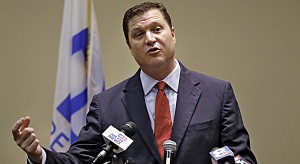FL transit authority on hot seat for using taxes to campaign for tax increase

By William Patrick | Florida Watchdog
TALLAHASSEE, Fla. — A Pinellas County public transit board is on the hot seat over its use of taxpayer money to promote a $1.7 billion light rail plan that requires a significant local tax increase to fund it.
INVESTIGATE IT: Florida Sen. Jeff Brandes, R-St. Petersburg, has called for an investigation into the Pinellas Suncoast Transit Authority’s use of taxpayer money.
Critics say the Pinellas Suncoast Transit Authority has been using hundreds of thousands of taxpayer dollars to persuade area residents to vote higher taxes on themselves — a possible violation of state law.
The transit authority has been engaged in a public education campaign called Greenlight Pinellas, in advance of a November ballot referendum that will ask voters to approve a sales tax increase.
Several previous Watchdog.org reports have raised questions about PSTA ridership claims and the reliability of the project’s cost estimates and proposed economic benefits.
On Tuesday, state Sen. Jeff Brandes, R-St. Petersburg, called for an investigation.
In a Tuesday letter directed to Ananth Prasad, secretary of the Florida Department of Transportation, Brandes wrote, “Specifically, I ask that the Inspector General review the expenditure by the PSTA of approximately $800,000 for promotions of this (Greenlight Pinellas) campaign to determine if the expenditure constitutes a violation of state law.”
As a government entity, the Pinellas Suncoast Transit Authority is barred from using taxpayer money to engage in political advocacy leading up to a referendum vote. If the authority is found in violation of state law, Brandes told Watchdog.org in a phone interview he wants the money refunded immediately, along with a public apology.
Bob Lasher, PSTA’s external affairs officer, said the transit authority hasn’t committed any wrongdoing.
“PSTA has always, and continues to, conduct its Greenlight Pinellas Educational outreach with full transparency and in full compliance with the law,” Lasher told Watchdog.org in an email.
In his letter, Brandes referenced the transit authority’s practice of directly messaging residents and distributing novelty materials, such as pens and necklaces, concerning the proposed 30-year, $1.7-to-$2.3 billion light rail and bus expansion plan.
PSTA’s funding also comes in part from the federal government and passes through the state Department of Transportation. As part of its online campaign, PSTA officials spent grant money from the U.S. Department of Homeland Security to produce Youtube videos directing viewers to visit GreenlightPinellas.com.
Lasher told Wachdog.org the transit authority’s board of directors authorizes Greenlight Pinellas expenditures. The board consists of 15 members and is chaired by Kenneth T. Welch, who also serves as a Pinellas County commissioner. Watchdog.org contacted Welch, but didn’t immediately receive a response.
“I can’t speak for what Sen. Brandes’ motives are,” Welch told the St. Petersburg Tribune. “I’m fully confident we have complied with the letter and intent of the law.”
According to the same story, Welch compared Brandes’ concerns with those of a group opposing the transit plan, called No Tax for Tracks.
Brandes told Watchdog.org his call for an investigation has nothing to do with the actual transit plan.
“It has everything to do with the potential misuse of scarce taxpayer resources,” he said.
Determining exactly where education stops and advocacy begins could be difficult to establish, but Welch and the PSTA might have some explaining to do.
“They’ve had no intention to talk about any of the negative facts of Greenlight Pinellas,” Brandes said.
“When my constituents are receiving (promotion) materials they should know the costs as well, including a billion dollar tax increase over 10 years on the ballot. I would say that’s a substantial negative. Having the highest sales tax in the state of Florida is a substantial negative,” he said.
If approved, the sales tax would also quadruple PSTA’s budget — from about $30 million to $130 million a year.
“We are proud of our efforts and are confident that any inquiries by the Department of Transportation will only confirm these facts,” Lasher said. “Every Greenlight presentation we make highlights the decision Pinellas voters will make this November — whether or not to approve the 1 percent sales tax for substantially improved public transportation.”
Raising Pinellas County’s sales tax by 1 percent, from 7 to 8 percent, is also a 14 percent jump in the tax rate. Dr. David McKalip, an area neurosurgeon, commissioned an independent poll in January to test whether the distinction would affect voter response. Polling data showed 60.9 percent of likely voters would not support the tax increase.
Together with Yes for Greenlight, a coalition of business and civic organizations, PSTA appears determined to overwhelm skeptics, especially those who sank an expensive light rail plan across the bay in Tampa in 2010.
YesforGreenlight.org explicitly asks, “the voters of Pinellas County to approve a one cent sales tax increase in November that will transform bus service and create a modern passenger rail system.”
The website also has a direct passthrough link to GreenlightPinellas.com, the transit authority’s website, and solicits donations. Both sites share the same coloring, font and general look and feel — potentially confusing interested residents.
Barbara Haselden of No Tax for Tracks is a vocal opponent of Greenlight Pinellas. Haselden has organized her own community education campaign with little money compared to the PSTA.
“All the public money they’re spending shouldn’t just be for one side of the debate,” she told Watchdog.org.
Offering a case in point, Haselden said 12 PSTA buses are wrapped with Greenlight Pinellas ads claiming “the future of transit.” In an attempt to air an alternate point of view, Haselden tried to buy ad space on five buses at a cost of $15,000. She was turned away.
“We tried to do the same thing they were doing but with our own money,” she said. “But they turned us down because they said it was political.”







